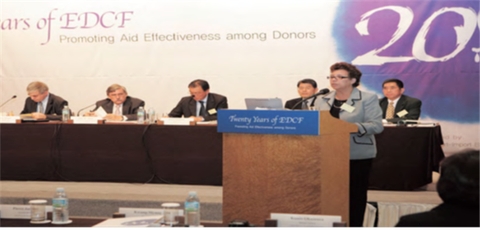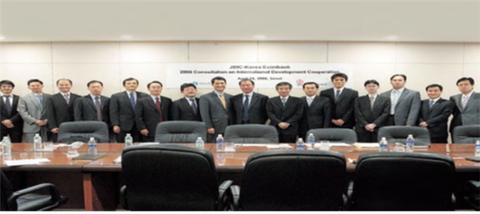official aid
Strengthening external relationship and harmonization
1. Raising Public Awareness on International Development Cooperation
As a government agency, it is important that the EDCF gain public consent to a certain extent in order to scale up the ODA volume. However, public awareness on the government’s ODA activity was rather low. According to a survey result of the MOSF in October 2005, only 44% of the Korean people were even “somewhat aware of ODA,” and 46% had “heard about it but were not fully aware of ODA.” The survey also showed that 18% of those surveyed were strongly in favor of increasing the ODA levels, 35% supported a moderate increase, 28% thought the current level was appropriate and 13% wanted a decrease in ODA. Recognizing the need to put more weight on enhancing public awareness to successfully scale up its ODA volume, the EDCF began to exert efforts to this end.
To strengthen public support for its ODA activity, the EDCF devises action plans to raise public awareness on an annual basis, focusing on: 1) advertising EDCF activities through the media, 2) providing indirect experience of EDCF activities to the public by releasing related information and publishing case studies of EDCF projects, and 3) enhancing the relationship with various EDCF stakeholders such as lawmakers, government officials, civil societies, and academia by providing opportunities for lawmakers or government officials to participate in the EDCF project evaluation process, or by contributing to domestic and international seminars or workshops organized by civil societies or the academia.
The media can be a very powerful tool for the EDCF to deliver its opinion or related information to the public. Since 2005, the EDCF contributed seven special reports and eight professional opinions to the newspapers, sent out press releases, and broadcasted three TV documentaries. The documentaries were especially an indirect, yet effective means, providing the people with a clear picture of what the EDCF is doing and how the EDCF’s ODA activities contribute to the economic growth of developing countries.
Lawmakers and government officials are the main stakeholders to the EDCF in terms of budgeting and policy making. So, it is important for them to have knowledge on the mechanism of EDCF activities; how the EDCF addresses development issues in developing countries, the EDCF’s past achievements, and the EDCF’s future goals. To enhance the relationship with lawmakers and government officials, the EDCF engaged them in the project evaluation process, which is also expected to greatly enhance their understanding on EDCF activities.
Another major stakeholder to the EDCF is the civil society, who helps to reinforce accountability and transparency of ODA activities. They collect various opinions from the society and deliver them to the government through seminars or workshops. The EDCF has tried to enhance communication with the civil society by participating in or organizing seminars or workshops, so that civil societies interested in EDCF activities could express or deliver their opinion. In 2007, an international conference under the title of “Promoting Aid Effectiveness among Donors,” was held by the EDCF, as well as a workshop and seminar. Also, the EDCF participated in 28 seminars or workshops organized by various civil societies, institutions, and other government organizations. The EDCF’s interaction with the civil society in the ODA context is expected to grow further in the future.
The academia also plays a significant role in the government’s ODA activities by providing theoretical grounds for such aid and helping to set the directions. About 200 members consisting of professors, specialists, and civil society staff members launched the Korea Association on International Development and Cooperation (KAIDC) in October 2007. KAIDC, as the first academic association in the Korean ODA society, is expected to contribute to the development of good contents on Korea’s own development experience and provide its professional opinion to the government. These efforts will help to balance the domestic voice on any ODA disputes or controversies that may occur. The EDCF highly welcomes such efforts and will actively support their activities.
In addition, the EDCF has also established its own website under Korea Eximbank’s homepage (www.koreaexim.go.kr) to communicate more effectively with the public.

[Picture 1-1] EDCF International Conference in Commemoration of its 20th Anniversary in 2007
Source: The Export-Import Bank of Korea. 2008. EDCF Your development partner 1987-2007, History book. Seoul.
2. Enhancing Harmonization with Other Donors
As indicated in the Paris Declaration in March 2005, harmonization among donors is one of the five main objectives of this declaration. To deliver aid more effectively, the declaration recommends that donors’ actions be more harmonized, transparent and collectively effective. The EDCF has fully supported this agenda by communicating more with other multilateral and bilateral development agencies, participating in various international joint initiatives or statement, independently or jointly hosting international seminars, and contributing to joint activities which are related to reducing poverty in developing countries.
To enhance harmonization with MDBs and the OECD, the EDCF operates staff exchange programs with them aiming to build the staff’s capacity and expand human network. The program started in December 1989 when the EDCF seconded a staff to the ADB. Currently, six staff members are seconded to the OECD and MDBs such as IBRD, ADB, AfDB, EBRD, and IDB. In January 2007, the EDCF set up a project development office within the EDCF group in Korea Eximbank, an independent office to cover co-financing and collaboration issues with MDBs. As of 2007, the project development office held three joint seminars and supported nine co-financing projects totaling USD 185 million with various MDBs. Also, they annually hold a consultation meeting with each MDB to seek more opportunities to work together and enhance donor harmonization.
The first EDCF partner for enhancing bilateral harmonization was JBIC. In March 2006, the EDCF contacted JBIC to discuss cooperative prospects for the enhancement of mutual relationship. Through a number of discussions, the EDCF and JBIC were able to have their first working level staff meeting in July 2006. Since the first meeting, the EDCF and JBIC continued to hold meetings to enhance harmonization. Semi-annual working level staff meetings were held three times since July 2006, one joint study was conducted, discussions aiming to seek the possibility of co-financing were held, and field level discussions were carried out in some partner countries such as Viet Nam, Indonesia, and the Philippines.

[Picture 1-2] The Third Working Level Meeting between the EDCF and JBIC in 2008
The EDCF’s strategy for bilateral harmonization is to extend its JBIC network to other donors. For instance, the five banks initiative among major donors in Viet Nam became the six banks initiative as the EDCF joined the initiative in 2007. Currently, the six banks initiative consisting of World Bank, ADB, AFD, JBIC, KfW Entwicklungsbank, and Korea Eximbnak is working together to enhance aid effectiveness in Viet Nam by realizing the division of labor among members and developing a best practice for delivering and processing ODA projects.
The work is being carried out in close cooperation with the Vietnamese government. Also, the EDCF has participated in several international joint initiatives or joint statements such as the Joint Initiative for Sustainable Urban Development held in 2006 which urged the participating seven donor agencies to strengthen their efforts to address negative side effects of urban development, and the Joint Statement for Sustainable Debt Management held in 2007 which was accepted by five donor agencies who operate concessional loan aid.
The next step of the EDCF in enhancing bilateral harmonization is to expand its network with both advanced donors such as the AFD, KfW, and other emerging donors.
Source: The Export-Import Bank of Korea. 2008. EDCF Your development partner 1987-2007, History book. Seoul.
